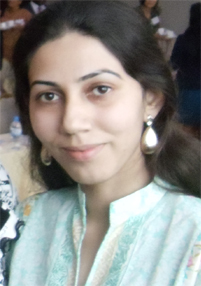It is commonly believed that people who do their Masters degree in Urdu, Islamic Studies or Persian are sort of at a lower rung of the ladder, incapable etc. That is precisely why I chose to do my Masters in Urdu__ no, not because I was incapable but because the choice seemed like a nice and rebellious one! But seriously, I studied and taught Urdu because I wanted us to take pride in our intellectual heritage with full confidence. You cannot think without a language; and for the reference point of the thought paradigm to be our own, we must know our own language. We must not speak or study Urdu apologetically; nor must it be taught to our children as a second priority. I studied Urdu to be content with myself. My unique teaching stance would be my inclination to love people more for thei r weaknesses than for thei r achievements. That is why in my classroom there is always room for students to be confused. I taught a course in Urdu Literature at the Lahore University of Management Sciences (LUMS). The first time I taught the course, this Urdu course was taught almost in English! I taught them to relish the Urdu language, its sounds and nuances. I would tell my students about the life and times of the Urdu poet Ghalib and then invite them to explore his poetry. People tune out of Urdu as soon as the teacher starts off with ‘The poet here says..’ as if the poet had personally come and whispered to the teacher what he really meant! Since the poet has done no such thing, my students make their own meaning from poetry. What was important was for my students to appreciate that Urdu literature was like literature in any other language, meant to be enjoyed. Urdu spellings and writing will not be useful for my students; it was developing an ear for the language that was important. Once the thought would reach them, the language would come naturally too. I would ask them to read a verse five times and make some meaning out of it. If they found a word or phrase particularly difficult, I would supply the meaning. In the initial writing assignments I gave them permission to use the English word if they couldn’t think of an apt Urdu word to convey their meaning. By the end of the course, there wasn’t a single student using a single English word. As word spread about my course on Ghalib and Faiz, another Urdu poet and activist, other faculty members would request to sit in on my class too. Students who had already taken the course would want permission to come and sit every now and then. This was a generation of what I call the ‘burger kids’, totally aligned with western language, mannerisms and values. At the end of the course these under-grad students were writing aweinspiring theses on topics such as: ‘Faiz and I: Coercion and its Reaction.’ My students reached this level because they were allowed to engage with the texts at a deeper level; I didn’t make them swallow a pill called Urdu Poetry, I gave them opportunities to wrestle meaning out of the verses. Of course learning Urdu has its practical benefits too. My student Esa Khokar later told me that he managed to secure a job at a bank because he could impress the panel with what he had to say about Urdu poetry. (It came up when the interviewers saw the Urdu course mentioned on his resume). The closer you bring education to real life, the more deeply embedded it will be in the students’ mind and the farther reaching its impact will be in the life of a student. When I was teaching at Lahore College my colleagues were perturbed by my teaching practice. ‘All the students will fail the exams, she is not teaching the syllabus!’ they would tell the management with wide-eyed anxiety. As it happened, I have had a 100% result throughout my teaching career. I was teaching the syllabus but with a slant towards real life references. I used to give heaps of written assignments, all asking them to think. I would give a short statement and ask them, ‘What do you understand from this?’ I felt that verbal communication and discussion lacks the art of discipline. If your words and thoughts are in written, concrete form, then you can fine-tune them too. Among my own mentors I would like to mention the principal of Government College, Dr. Nazir Ahmad. He taught me how to live breaking the orbit of your own self. I have learnt to live from a duck; how it swims in water yet keeps its neck and chest out of the water. When it reaches ashore, it flaps its wings to shake out all water, keeping itself pure and pristine. The author has taught extensively at Lahore College where she was also the Vice Principal and at the Lahore University of Management Sciences. She served on the National Commission for Status of Women. She currently gives talks on the poetry of Faiz Ahmed Faiz at Faiz Ghar, Lahore.
Disclaimer: The views expressed here are those of the authors and do not necessarily represent the views of Idara-e-Taleem-o-Aagahi (ITA)





